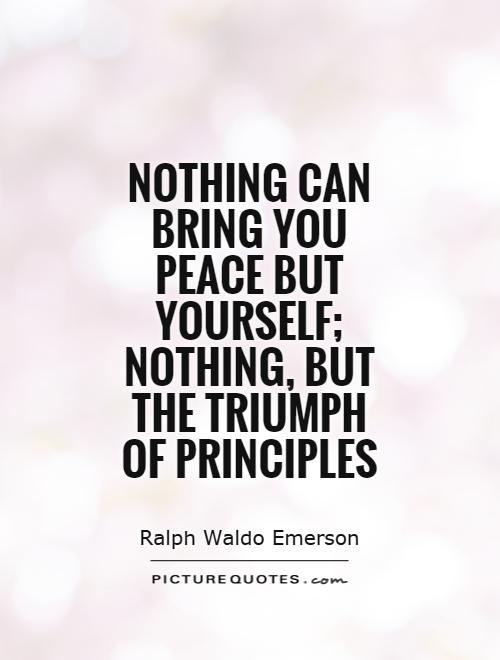Nothing can bring you peace but yourself; nothing, but the triumph of principles

Nothing can bring you peace but yourself; nothing, but the triumph of principles
Ralph Waldo Emerson, a renowned American essayist, lecturer, and poet, is often celebrated for his profound insights on self-reliance and individualism. One of his most famous quotes, "Nothing can bring you peace but yourself; nothing, but the triumph of principles," encapsulates his belief in the power of self-reliance and the importance of living in alignment with one's own values and beliefs.Emerson believed that true peace and contentment can only be found within oneself. External circumstances and material possessions may provide temporary happiness, but lasting peace can only be achieved by looking inward and cultivating a sense of inner harmony. This idea is echoed in his essay "Self-Reliance," where he encourages individuals to trust their own instincts and beliefs, rather than conforming to societal expectations or seeking validation from others.
Emerson also emphasizes the importance of living in accordance with one's principles and values. He believed that true success and fulfillment come from staying true to oneself and following one's own moral compass. In a world that often values conformity and external validation, Emerson's words serve as a reminder to stay true to one's beliefs and convictions, even in the face of adversity.
The concept of the "triumph of principles" is central to Emerson's philosophy. He believed that by living in alignment with one's principles, one can achieve a sense of inner peace and fulfillment that transcends external circumstances. This idea is reflected in his emphasis on individualism and self-reliance, as well as his belief in the power of personal integrity and moral courage.












 Friendship Quotes
Friendship Quotes Love Quotes
Love Quotes Life Quotes
Life Quotes Funny Quotes
Funny Quotes Motivational Quotes
Motivational Quotes Inspirational Quotes
Inspirational Quotes